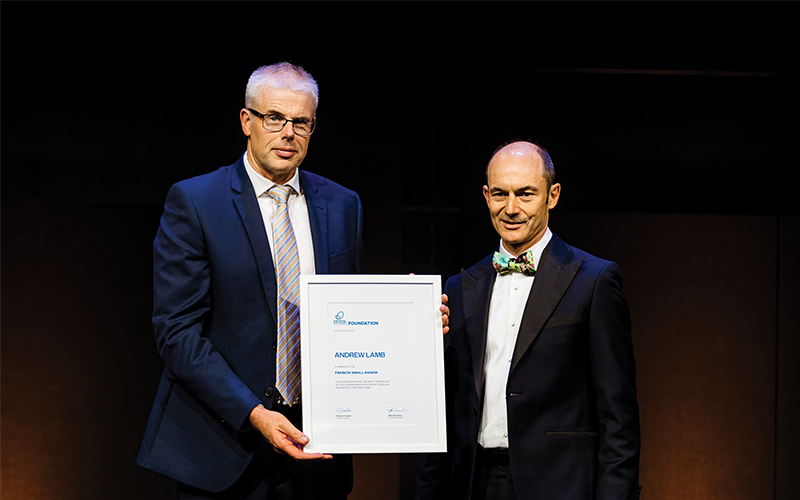16 Jun 2025
The winner of a new Engineering New Zealand Foundation award recognising voluntary work reflects on a journey of service that began as a child, and will continue as he spends his prize money.
“I was genuinely surprised,” says Christchurch’s Andrew Lamb MEngNZ, the inaugural recipient of the Francis Small Award, presented by the Engineering New Zealand Foundation in recognition of outstanding voluntary service to the profession. He was volunteering when he got the phone call bearing the good news.
“There are so many volunteers out there doing great work – many equally or more deserving. But as the news sank in, I started hearing from people I’d worked with over the years, sharing memories of how I’d encouraged, supported or influenced them. That meant a lot.”
With more than 15 years of voluntary contributions to the profession, from post-quake leadership in Canterbury, to mentoring and committee work, Andrew has been recognised as embodying the award’s spirit of service.

Volunteering is second nature to him – he grew up in a family where service was part of daily life. “Mum and Dad were both heavily involved – school boards, church committees, local causes. My brothers and I just followed their lead. It felt natural.” That sense of community found new meaning when Andrew reconnected with Engineering New Zealand after working overseas.
“As a product design engineer with few Engineering New Zealand member peers at the time, I often felt a bit isolated. Volunteering opened up a much broader network – civil, structural, electrical – and that diversity of thinking and connection was energising.”
His dedication as a volunteer was perhaps most evident following the Canterbury earthquakes. As Engineering New Zealand Canterbury Branch Chair, Andrew played a key role coordinating local engineers and liaising with the Engineering New Zealand office in Wellington. He advocated for members, pushed for communication during a critical period and even built the first version of the urban search and rescue database on his work computer.
“It was incredibly challenging,” he says, “but also so rewarding. Helping shape the local response, organising events and seeing members share knowledge and support each other – that’s when I saw the real impact of volunteering.”
He's quick to point out that volunteering isn’t about personal recognition or profile. “It’s never been about me,” he says.
“But I’ve realised it has shaped my career in ways I didn’t expect. I’ve met people I wouldn’t have otherwise, developed skills and discovered new interests. Sometimes it’s helped me feel grounded through life’s ups and downs. That broader connection to the profession really matters to me.”
Helping shape the local response, organising events and seeing members share knowledge and support each other – that’s when I saw the real impact of volunteering.
Through his work with the Canterbury Branch, the University of Canterbury’s Industry Advisory Board and creating more than 200 Branch events, Andrew has helped pave the way for others.
“I’ve always said: design the events you want to attend. That’s the joy of it – creating something meaningful, alongside people you respect.”
As for his advice to other engineers wondering how to find the time to volunteer: “We make time for what we value. It doesn’t need to be a massive commitment – just find something that aligns with your skills or interests. Start small. Go to a local branch meeting. Help organise one event.”
And to employers or managers concerned about the time volunteering takes, Andrew suggests the benefits far outweigh the drawbacks.
“It’s an opportunity for staff to develop a wider range of skills that support their personal and career development.”
Beyond engineering, Andrew has contributed to his community through sports teams, environmental projects and, more recently, the local MenzShed and grassroots efforts like salvaging timber from an earthquake-damaged church and distributing it to local charities. He says the experience that had the greatest effect on him brought together his two greatest passions: cricket and travel. In 2015, he spent a month in Sri Lanka with the Cricket Live Foundation, a New Zealand charity improving the lives of underprivileged children through cricket.
Andrew plans to put the $10,000 from his award toward postgraduate business studies with a focus on how technologies like the Internet of Things and AI are shaping the future of work. “It’s a practical way to keep learning and hopefully connect and contribute even more.”
Learn more about volunteering opportunities.
This article was first published in the June 2025 issue of EG magazine.





